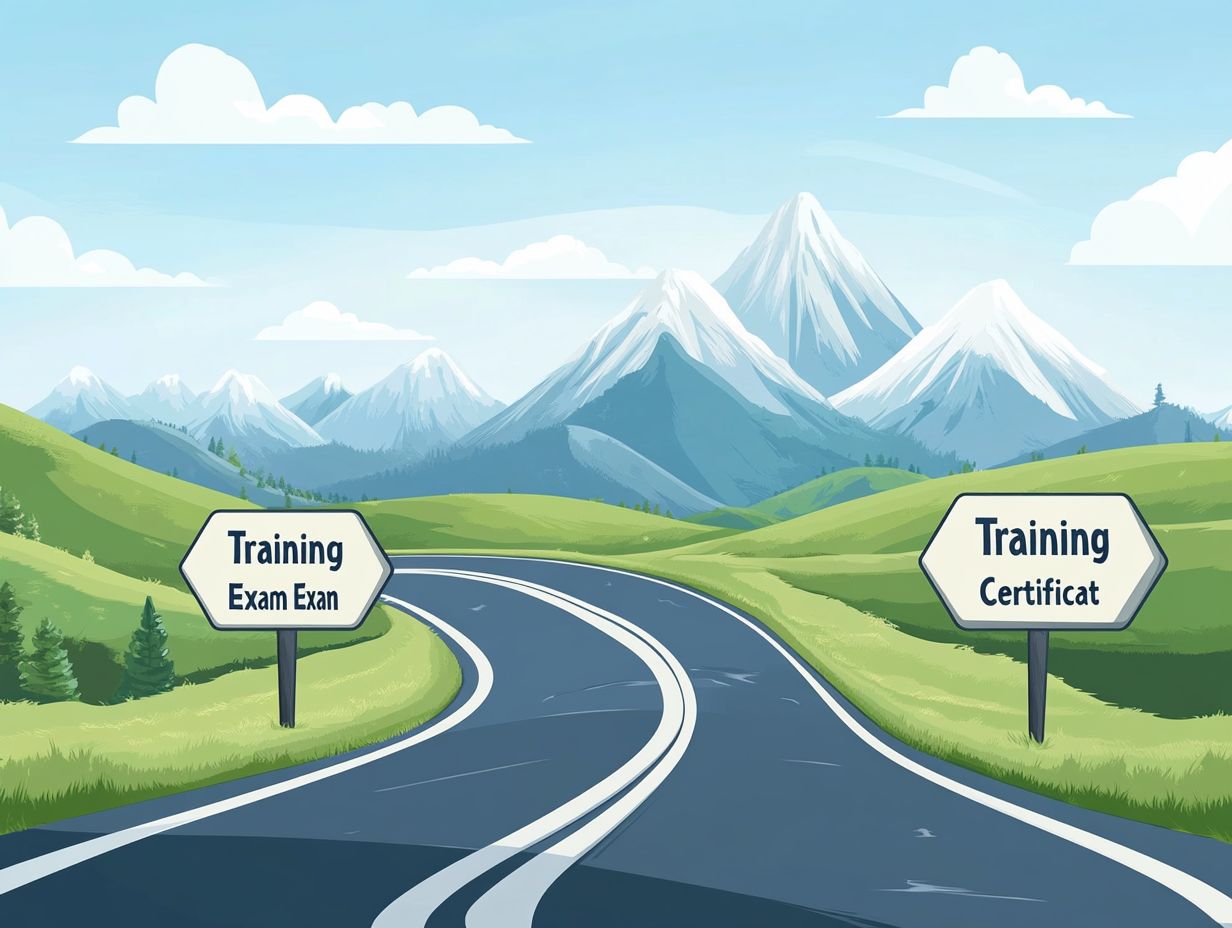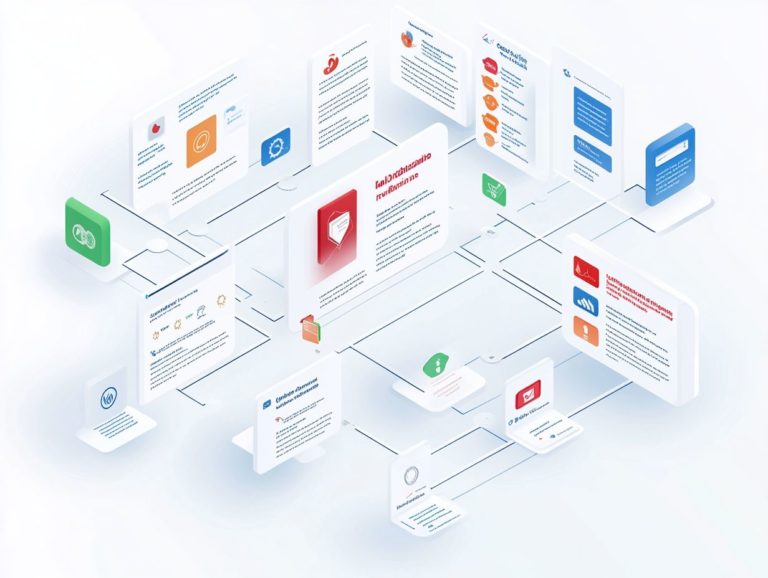The Path to Becoming a Certified Information Systems Auditor
In today s digital landscape, your role as a Certified Information Systems Auditor (CISA) is pivotal in ensuring the integrity and security of information systems. Prepare now to secure your future in cybersecurity!
This guide explores everything you need to know about CISA certification, highlighting its significance in the cybersecurity realm.
It also covers the educational and professional prerequisites you’ll need to meet.
Moreover, you ll find effective strategies for your exam preparation, ensuring you re well-equipped for the challenge ahead.
Expect an exploration of the exam format, insights on maintaining your certification, and a glimpse into the rewarding career opportunities that await CISA professionals.
Whether you re considering this path or looking to elevate your expertise, this overview is tailored for you.
Contents
- Key Takeaways:
- What is a Certified Information Systems Auditor (CISA)?
- Requirements for Becoming a CISA
- Preparing for the CISA Exam
- Taking the CISA Exam
- Maintaining CISA Certification
- Career Opportunities for CISA Professionals
- Frequently Asked Questions
- What is the Certified Information Systems Auditor (CISA) certification?
- What are the benefits of becoming a Certified Information Systems Auditor?
- What are the requirements for becoming a Certified Information Systems Auditor?
- What is the format of the CISA certification exam?
- How can I prepare for the CISA certification exam?
- What are the maintenance requirements for maintaining the CISA certification?
Key Takeaways:

The Certified Information Systems Auditor (CISA) certification is crucial for professionals in information systems, ensuring a high level of expertise and credibility. Fulfilling the necessary educational and professional requirements and adequately preparing for the CISA exam are essential steps toward becoming a certified auditor.
Maintaining CISA certification requires continuous learning and meeting renewal requirements, but it opens up various career opportunities with significant roles in the field of information systems.
What is a Certified Information Systems Auditor (CISA)?
A Certified Information Systems Auditor (CISA) is a prestigious certification awarded by ISACA, aimed at professionals like you who assess and manage an organization s information systems auditing and control processes.
This certification is crucial for ensuring that your information systems function effectively while adhering to industry regulations and governance frameworks.
As a CISA professional, you will take on a diverse array of responsibilities, including conducting audits, ensuring regulatory compliance, and providing guidance on how companies manage their IT resources.
Given the rising significance of information security and regulatory compliance, obtaining the CISA certification can significantly enhance your professional standing in the field of information systems.
Requirements for Becoming a CISA
To achieve the esteemed title of Certified Information Systems Auditor (CISA), you must fulfill particular educational and professional criteria established by ISACA. This ensures you possess the essential knowledge and skills required for effective auditing of information systems.
Educational and Professional Requirements
To obtain a CISA certification, you need a bachelor’s degree and a minimum of five years of experience in information systems auditing, security, or control.
It’s advisable for candidates like you to hold degrees in fields such as Information Technology, Computer Science, or Business Administration, as these areas provide a robust foundation for navigating the complexities of information systems.
Relevant roles to consider such as IT project managers, consultants, or internal auditors are essential, as they directly contribute to the practical experience required for certification.
Pursuing further certifications is important to expand your knowledge and keep aligned with the latest industry trends and regulatory standards critical for effective risk management.
Preparing for the CISA Exam

Preparing for the CISA exam demands a strategic approach that goes beyond mere memorization.
You ll want to leverage a diverse array of study materials and adopt effective learning strategies tailored to your unique style.
This thoughtful preparation is essential for ensuring your success in achieving this esteemed certification.
Study Materials and Tips for Success
To prepare effectively for the CISA exam, embrace various study materials. Official ISACA resources, practice exams, and peer study groups elevate your learning experience.
Textbooks focusing on critical concepts help you understand complex topics. Online courses offer the flexibility you need with interactive content for different learning styles.
Discussion forums connect you with others who share your goals. This facilitates knowledge exchange and clears up any doubts.
Establish a study schedule to ensure consistent progress. This approach helps you break down the syllabus into manageable sections.
Joining study groups fosters collaboration. Members can share insights and offer different perspectives, enriching your understanding.
Incorporate hands-on experience through simulations or practical projects. This reinforces theoretical learning and helps you grasp real-world applications of auditing principles.
Taking the CISA Exam
The CISA exam is a challenging assessment that evaluates candidates across various domains in information systems auditing. Key areas include governance, management, and assurance processes.
The exam is structured to measure your knowledge and expertise effectively in these fields.
Exam Format and Scoring
The CISA exam has 150 multiple-choice questions that assess your expertise across various domains. Your score determines whether you pass this critical assessment.
These questions cover essential areas, such as:
- The IS audit process
- Governance and management of IT
- Information systems acquisition, development, and implementation
- The protection of information assets
Understanding this distribution helps you focus your studies on heavily emphasized domains. Scoring considers not only correct answers but also the complexity of the questions tackled.
Practice exams are invaluable. They familiarize you with the exam format and types of questions, boosting your confidence for exam day.
Maintaining CISA Certification

Maintaining your CISA certification demands ongoing education and adherence to renewal requirements by ISACA. This commitment keeps you informed in the evolving landscape of information systems auditing.
Continuing Education and Renewal Requirements
To maintain your CISA certification, complete at least 20 Continuing Professional Education (CPE) credits each year. This keeps you updated with the latest developments in the field.
You can earn credits by attending conferences that provide networking opportunities and insights into emerging trends.
Participating in webinars allows you to learn from industry experts while fitting education into your busy schedule.
Completing relevant coursework enhances your expertise. Ongoing learning is essential to uphold the highest standards in your profession.
Career Opportunities for CISA Professionals
As a CISA professional, you ll find a wealth of career opportunities across various sectors, including IT security, governance, compliance, and auditing. With a strong job outlook and rising demand for skilled auditors, your expertise is highly sought after.
This paves the way for a fulfilling and dynamic career!
Roles and Responsibilities in the Field
As a CISA professional, you are entrusted with critical responsibilities that include assessing IT processes, ensuring regulatory compliance, and implementing effective audit practices. These functions are essential to the governance and management of IT within your organization.
You often work at the intersection of technology and business, tasked with evaluating and mitigating risks by crafting comprehensive risk management strategies. Your careful planning includes identifying vulnerabilities while collaborating with various departments to ensure compliance checks are both thorough and effective.
To thrive in this role, you need deep technical expertise that enables you to understand complicated IT settings and apply analytical thinking skills to dissect intricate data patterns and trends. This unique skill set gives you the power to proactively address issues before they escalate, safeguarding the integrity and efficiency of IT systems.
Frequently Asked Questions

What is the Certified Information Systems Auditor (CISA) certification?
The Certified Information Systems Auditor (CISA) certification is a globally recognized professional certification for information systems audit, control, and security professionals. It is offered by the Information Systems Audit and Control Association (ISACA) and is considered one of the most prestigious and sought-after certifications in the IT industry.
What are the benefits of becoming a Certified Information Systems Auditor?
Becoming a Certified Information Systems Auditor can greatly enhance your career opportunities and boost your salary! It can also lead to increased recognition as an expert in the field.
What are the requirements for becoming a Certified Information Systems Auditor?
To become a Certified Information Systems Auditor, you must have a minimum of five years of professional experience in information systems auditing, control, or security. You must also pass the CISA certification exam, follow a set of professional ethics, and agree to comply with the Continuing Professional Education (CPE) policy.
What is the format of the CISA certification exam?
The CISA certification exam consists of 150 multiple-choice questions and is offered in a computer-based format. The exam is four hours long and covers five domains: The Process of Auditing Information Systems, Governance and Management of IT, Information Systems Acquisition, Development, and Implementation, Information Systems Operations, Maintenance, and Support, and Protection of Information Assets.
How can I prepare for the CISA certification exam?
To prepare for the CISA certification exam, you can enroll in a training course or self-study using study materials provided by ISACA. It is also recommended to gain practical experience in information systems audit, control, or security and to take practice exams to familiarize yourself with the exam format. Get started on your CISA journey today!
What are the maintenance requirements for maintaining the CISA certification?
To maintain the CISA certification, you must comply with ISACA’s Continuing Professional Education (CPE) policy, which requires you to earn and report a minimum of 20 CPE hours per year and 120 CPE hours over a three-year period. You must also pay an annual maintenance fee and adhere to the Code of Professional Ethics.




